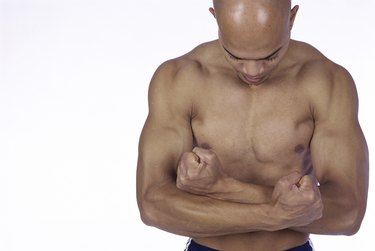
Creatine is a naturally occurring nutrient that can help rapidly restore energy during intense activity such as weightlifting or sprinting. Creatine also gathers a large amount of water and can cause imbalances in hydration and electrolytes, resulting in cramping. Supplementation with creatine especially in hot environments or during intense exercise may require an increase in fluid intake.
Creatine Use
Video of the Day
Creatine is a naturally occurring amino acid that is used to rapidly regenerate energy in muscles during intense activity such as weightlifting. Creatine is found in the muscle tissue in meat and fish. It is also commonly included in workout supplements to increase endurance, strength and muscle mass, although results are mixed. While some may find large increases in energy and strength with creatine, some may lack the ability to absorb high amounts into muscle tissue.
Video of the Day
Creatine and Dehydration
Creatine is a very hydrophillic molecule that draws large amounts of water to itself. High doses of purified creatine in workout supplements greatly increase the body's demand for water. If creatine supplements are not taken with enough water, they may cause dehydration, especially during hot weather or intense activity. However, not all experts agree on creatine's role in dehydration. A report in the July 2008 issue of the "British Journal of Sports Medicine" creatine may actually boost athletic performance in hot conditions by maintaining red blood cell volume, aiding in maintaining body temperature and lowering your exercising heart and sweat rate. Though it won't hurt to drink more water during hot weather and creatine supplementation, it may not be necessary. Talk to your physician on what would be right for you.
Dehydration and Cramping
Muscle cramps can be caused by inadequate blood supply, nerve compression or mineral depletion. Mineral depletion and inadequate blood supply occur during dehydration. Symptoms of dehydration to watch for while taking creatine include dry mouth, low urine output, no tears, sunken eyes and lethargy. Along with drinking more liquids, you can help prevent dehydration by eating foods with high water content, such as sweet potatoes, tomatoes, cucumbers, apples, melons, potatoes, squash, berries, leafy greens and grapefruit, according to the USDA National Nutrient Database.
Safely Using Creatine
Creatine is safe to use if taken with enough water. Consume adequate amounts of water and electrolytes when using creatine supplements during exercise. Avoid high doses of creatine before prolonged exercise, especially in hot environments. It is recommended that you consume at least three liters of water per day while supplementing with creatine. Do not take creatine supplements in the evening, as this may raise the risk for dehydration during the night.
- University of Maryland Medical Center: Creatine
- MedlinePlus.com: Muscle Cramps
- PubMed Health: Dehydration
- British Journal of Sports Medicine: Putting to Rest the Myth of Creatine Supplementation Leading to Muscle Cramps and Dehydration
- USDA National Nutrient Database: Water Content of Fruits and Vegetables
Is this an emergency? If you are experiencing serious medical symptoms, please see the National Library of Medicine’s list of signs you need emergency medical attention or call 911.